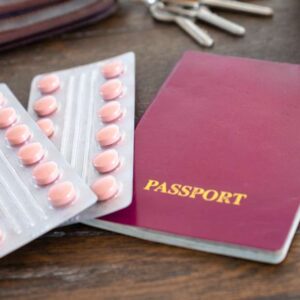
Medications That Don't Mix Well with Coffee
If you’re a regular Living Well Daily Reader (and I certainly hope you are), I probably don’t need to tell you I’m a coffee fan.
I regularly share information on coffee’s many health benefits—from boosting metabolism to reducing disease risk.
But many don’t realize that cup of Joe can interact with common medications, sometimes reducing their effectiveness by more than half.
Are you taking one of them?
Coffee is delicious. And when you don’t load it up with sugar and a gallon of cream, it has a bunch of health benefits.
But if you’re taking certain medications, your favorite morning brew could interact with them.
Let me walk you through some of the most concerning interactions I see:
- Thyroid Medication: If you take levothyroxine with your coffee, you could be absorbing less than half of your prescribed dose—meaning less medication actually gets into your bloodstream to do its job. Caffeine speeds the movement of the drug through the digestive system. This can leave you feeling fatigued, gaining weight, and experiencing other hypothyroid symptoms despite taking your meds. Take thyroid medication with plain water at least 30-60 minutes before your first cup of coffee.
- Blood Pressure Medications: The absorption of hypertension drugs like felodipine and verapamil can be reduced with coffee. Even more concerning, the stimulant effect of caffeine can counteract the intended effect of medications like propranolol that are designed to slow your heart rate. If you’re on any of these meds, discuss your caffeine consumption with your doctor.
- Diabetes Medications: The relationship between coffee and diabetes drugs is complex. Adding a lot of sugar or cream to your coffee could cause blood sugar spikes. But in some cases, even black coffee can work against your meds, temporarily increasing insulin and blood sugar levels. Remember that research has also found that coffee benefits diabetics by reducing blood sugar and medication needs. So, if you aren’t experiencing blood sugar spikes, and your doctor approves, go ahead and enjoy your Java.
- Osteoporosis Medications: Drugs like risedronate or ibandronate can lose more than half their effectiveness when taken with coffee. For these meds to work correctly, take them with water first thing in the morning, then wait at least 30 minutes before coffee.
- Alzheimer’s Medications: Caffeine tightens the blood-brain barrier (the protective filter that controls what substances reach the brain) and may reduce the amount of drugs like donepezil, rivastigmine, and galantamine that reach the brain.
- Antidepressants: Coffee can alter the metabolism of medications (how quickly your body processes and eliminates them) like fluvoxamine, amitriptyline, and escitalopram, increasing their side effects, such as insomnia and heart palpitations.
- Antipsychotic Medications: Studies show that drugs like clozapine, haloperidol, or olanzapine are metabolized more quickly when taken with coffee, potentially reducing their effectiveness.
- Asthma Medications: Some studies suggest coffee’s bronchodilating properties (its ability to open up airways in the lungs) might help with asthma symptoms. However, combining coffee with bronchodilating drugs like aminophylline or theophylline could increase the risk of side effects like headaches, restlessness, and stomach pain.
- Cold or Allergy Medications: Some over-the-counter allergy and cold remedies contain stimulants like pseudoephedrine. When combined with the caffeine in coffee, these drugs can cause uncomfortable jitters, anxiety, or insomnia.
In most cases, these coffee and drug interactions aren’t particularly dangerous, but they could reduce the effectiveness of some prescriptions.
On the other hand, studies show that coffee has lots of benefits. Your favorite morning brew can boost heart health, fight memory loss, and improve metabolism.
So, what’s the bottom line?
Check with your healthcare provider about any potential interactions with coffee or caffeine. And should you decide to continue drinking coffee, for most medications waiting one to two hours before drinking coffee can minimize interactions.
P.S. Could THIS type of coffee destroy diabetes?!
Written By Dr. Scott Olson, ND
Nearly 25 years ago, failed mainstream medical treatments left Dr. Olson in constant pain – and his health in ruins. And that’s when he did something REVOLUTIONARY. He began his career in medicine – and dedicated his life to uncovering the true, underlying causes of disease.
Through his innovative medical practices in Tennessee and Colorado, Dr. Olson has helped cure countless seniors from across America of arthritis… heart disease… diabetes… and even cancer. All without risky prescription drugs or painful surgeries.
View More Free Articles
Study EXPOSES Hidden Danger Lurking in Your Car
We think of our homes and cars as safe havens. But according to a startling new study, they may be flooding your lungs with microscopic plastic particles—every single day. Researchers in France recently found that adults inhale an average of 68,000 microplastic particles daily from indoor air alone. To put that in perspective, that’s about...
Mailbag: Is Modern Food Making You Snore?
“What can cause snoring, and is there a way to correct this issue?” —Seeking Silence Hi Seeking, Snoring happens when the soft tissues in your throat relax and vibrate as air passes through during sleep. While several factors can cause snoring—from sleep position to nasal congestion—I want to share one trigger that might surprise you....
Simple Food Swap SLASHES Dementia Risk 28%
Let’s be honest… who would jump at the chance to cut their dementia risk by 28 percent. And no, you don’t need to run marathons, survive on broccoli, or learn to play the zither (whatever that is) to make it happen. All it takes is one easy swap—something that’s probably already in your refrigerator. Researchers...
This SMART Floss Exposes Hidden Health Danger
Scientists have created dental floss that doesn’t just clean between your teeth—it also tracks your stress while you’re flossing. Now, I know what you’re thinking… “Great—now even flossing is going to stress me out by telling me how stressed I am.” But this fascinating new tool from Tufts University could be a game-changer for understanding...
Is This "Safe" Sweetener Damaging Your Brain?
The headlines are alarming… “Popular Sugar Substitute Linked to Brain Cell Damage” and “Erythritol Could Damage Critical Brain Barrier” are just two of the dozens I’ve spotted recently. But before you toss every sugar-free product in your pantry, let’s take a closer look at what this study actually shows—and what it doesn’t. The latest research...
This Summer Threat Could SPIKE Your Blood Sugar
Picture this… It’s another scorching hot summer day. You crank up the air conditioning while watching the weather forecast, which predicts yet another “record-breaking” heat wave. It’s starting to feel like just another miserably uncomfortable summer. But what you might not realize is that—if you have diabetes—those rising temps could do far more damage to...
Move Over Yogurt—5 Foods That Pack MORE Probiotics
Let’s talk about your gut. The microbiome is the collection of trillions of bacteria and other tiny organisms that live in and on your body—especially in your gut—and help keep you healthy. I’ve written often about how vital it is to maintain a healthy microbiome. And you might have dutifully added yogurt to your shopping...
Is Your Heart Older Than YOU?
Maybe you feel young for your age. Good energy, decent sleep, eating your veggies. But what if I told you your heart might be a decade older than the rest of you? That’s exactly what researchers at Northwestern University found in a new study published in JAMA Cardiology. The average American woman’s heart is about...
Mailbag: 3-Pronged Attack CRUSHES Diabetes at the Source
“They told me I might have diabetes, so I would like to know how I can battle and eliminate diabetes.” —Fighting Back Hi Fighting, You have the exact right attitude—it will be your best weapon in this battle. Let’s face it, receiving a diabetes diagnosis is disturbing. You’re sitting there, shocked and wondering what it...
7 Natural Ways to Beat Jet Lag and Motion Sickness
Are you trying to squeeze in one last vacation this summer? Maybe it’s a beach getaway, a cross-country flight, or even a cruise. But let’s be honest: nothing takes the shine off a vacation faster than feeling nauseous on a boat… or jet-lagged and groggy for days after a flight. So, let’s talk about how...









